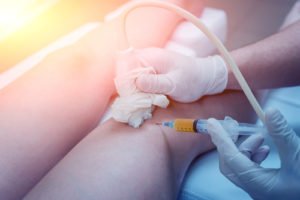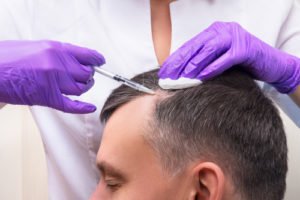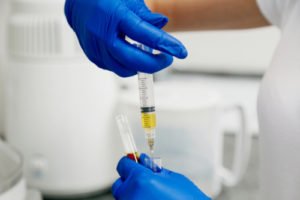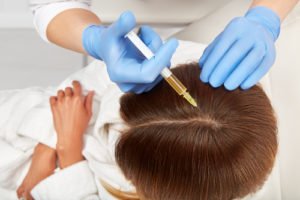
The effectiveness of platelet-rich plasma (PRP) knee injections will vary depending on the severity of a person’s condition and their medical history. According to Pilot and Feasibility Studies, PRP treatment can provide relief that lasts up to four months. Yet the University of Utah notes that PRP’s benefits can last up to three years. By speaking directly with a health care provider, you can learn more about your potential for receiving PRP injections, as well as what you can expect from this cutting-edge therapy.
Recognizing the Two Types of Chronic Osteoarthritis
The Cleveland Clinic reports that osteoarthritis is a chronic condition that can lead to pain, swelling, inflammation, and limited motion.
There are two types of osteoarthritis: primary and secondary.
- Primary osteoarthritis has no known cause and affects only specific body parts, including the digits, spine, hips, and toes.
- Secondary osteoarthritis has an underlying or contributing cause such as infection, birth injuries, or cartilage damage.
Current Reviews in Musculoskeletal Medicine (CRMM) report that PRP is a viable treatment option that is proven to relieve symptoms relating to both types of osteoarthritis. The journal also added that while PRP does not “cure” these conditions, it can provide relief to chronic sufferers.
Knowing What Causes Osteoarthritis
When osteoarthritis makes it difficult for a patient’s knees to function correctly, it can hinder ordinary movements like standing and walking. The body contains cartilage that protects the bones from friction and tear. As a result of injury or prolonged strain, the cartilage can wear away over time, causing the bones that meet at the joint to grind against each other.
Although age can be a contributing factor in developing osteoarthritis, it can strike men and women as young as 40 years old. It also strikes women more frequently than men.
Other contributing factors can include:
- Obesity
- Injuries
- Metabolic disorders
- Infections
According to the Journal of Knee Surgery, PRP has the potential to treat this debilitating condition. Its natural anti-inflammatory properties, along with repairing damage at the cellular level, make PRP a ripe treatment option for those suffering from osteoarthritis.
For a free consultation, call (305) 682-1818
Understanding the Restorative Benefits PRP Can Provide
Blood consists of liquid and solid components. Platelets are a solid component of blood that carry oxygen throughout the system, help ward off infection, and heal blood clots following an injury.
During PRP therapy for osteoarthritis in the knee, blood is first drawn, then placed in a machine that separates it into its various components. The platelets and plasma are isolated, specially treated, highly concentrated, and reinjected at the pain site. The University of Utah notes that PRP therapy can contain up to 10 times more platelets than blood itself, which can help boost healing.
PRP Has No Adverse Side Effects
To treat osteoarthritis, many people opt for surgery or other forms of extensive rehabilitation. This could impact their ability to continue with their preferred method of employment or achieve certain milestones.
PRP offers a painless, noninvasive alternative to dealing with symptoms relating to osteoarthritis. This in-house procedure (performed in under an hour) produces no adverse side effects since it is created from the biological components of a person’s own body.
The Iowa Orthopaedic Journal states that PRP has long been used in treatment plans for many health concerns, including erectile dysfunction, sports injuries, and musculoskeletal complications. Other than discomfort at the injection site, PRP targets soft tissue injuries and has healing properties specific to a person’s condition. Those suffering from osteoarthritis need to look no further.
Conventional Treatment Does Not Work For Everyone
When the knees cannot support typical movements, it can have a detrimental impact on many areas of life.
Some conventional treatments for knees damaged by osteoarthritis include:
- Lifestyle changes such as losing weight to minimize stress and pressure on the knees
- Rehabilitation, including physical and occupational therapy to learn coping mechanisms and physical adjustments
- Medications that provide pain relief
- Surgery to fully replace joints
These measures may not provide long-term relief and do not promise results for everyone. PRP is quickly administered, with the possibility of long-lasting results. With this in mind, there is no need to make sweeping changes to your lifestyle when a noninvasive treatment method is available.
Treat Osteoarthritis in the Knee With Platelet-Rich Plasma Knee Injections
Osteoarthritis in the knee can lead to pain and swelling that can limit both work and recreation. Additionally, the inactivity that comes along with this condition alters your lifestyle and makes you more prone to additional injuries.
Patients with osteoarthritis do not have to let pain and discomfort define their lives, especially when PRP is available to help regain ability and functionality. By contacting HealthGAINS, you can speak with a Wellness Advisor concerning your candidacy for PRP therapy. To learn more, call today at (305) 912-8828.
Call or text (305) 682-1818 or complete a Free Consultation Form







